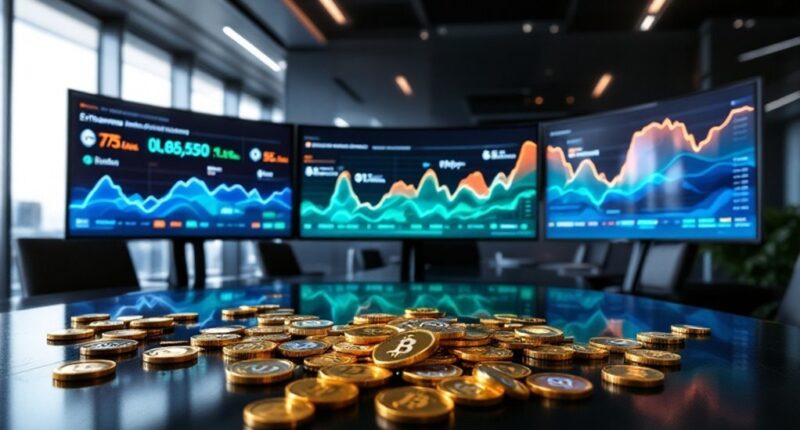Beyond BlackRock’s Bitcoin focus, surprising altcoins are gaining momentum. Ethereum targets $6,660 with its eco-friendly proof-of-stake system, while Ripple surges after SEC battles. Solana impresses with 65,000 transactions per second and a $75 billion market cap. Cardano’s methodical approach shows promise with Bitcoin integration. Newcomers like Mantra (partnered with Google) and SUI Network (with $2 billion TVL) represent the diverse opportunities reshaping cryptocurrency’s landscape. The market’s evolution reveals intriguing possibilities ahead.

While Bitcoin continues to dominate headlines in the crypto world, savvy investors are turning their attention to a select group of altcoins poised for remarkable growth in 2025.
Ethereum leads the pack with its robust $465 billion market cap and vibrant DeFi ecosystem. Like a city that never sleeps, Ethereum‘s platform hosts over 4,000 active developers building the future of finance. Its shift to Proof-of-Stake—think switching from a gas-guzzling SUV to an electric vehicle—has reduced energy consumption by 99.95%, positioning ETH to potentially reach $10,000 per token by year’s end. Analysts expect ETH to reach a stretched target of $6,660 in the coming market cycle.
Ripple has emerged from regulatory shadows with newfound vigor after the SEC dropped its appeal. XRP‘s price rocketed from $0.54 to $3.21 in just two months following U.S. elections—faster than a teenager’s mood swings. With annual transactions exceeding 1.5 billion and major banking partnerships, Ripple aims for the $5 mark by December. Recent data shows XRP has outperformed other altcoins in the top 10 by market capitalization with a 4x increase in Q4 2024.
Ripple’s meteoric rise from legal limbo to market darling proves that in crypto, yesterday’s underdog can become tomorrow’s champion.
Meanwhile, Solana continues its blistering pace, processing a whopping 65,000 transactions per second. That’s like comparing a supersonic jet (SOL) to a bicycle (older blockchains). With its market cap hitting $75 billion and projections of $500 per token, Solana’s 1,000+ dApps and $20 billion TVL demonstrate its staying power.
Cardano’s methodical approach is finally bearing fruit. Its Bitcoin integration has supercharged DeFi projects, while Hydra promises to deliver an astonishing 1 million TPS.
Not to be overlooked are emerging stars like Mantra, whose RWA tokenization platform has partnered with Google and grown its market cap by 760% in twelve months.
SUI Network’s institutional appeal for RWA projects and potential ETF development have driven its TVL to $2 billion.
And for those with appetite for higher risk, iDEGEN combines meme coin appeal with AI sophistication—an uncensored AI agent trained on Crypto Twitter that raised $8.6 million in its presale. Unlike typical meme coins where extreme volatility is common, iDEGEN aims to provide more stability through its AI-driven approach.
These altcoins represent the surprising dark horses in a rapidly evolving crypto landscape.
Frequently Asked Questions
How Does Blackrock Manage Regulatory Compliance for Its Crypto Investments?
BlackRock manages regulatory compliance for its crypto investments through a multi-faceted approach. The asset manager monitors evolving regulations across jurisdictions while proactively engaging with bodies like the SEC and CFTC.
They implement robust KYC/AML procedures and utilize advanced blockchain analytics for transaction monitoring. BlackRock also employs AI for detecting suspicious patterns and maintains thorough compliance documentation.
Additionally, they participate in industry working groups to help shape crypto regulations and advocate for clear regulatory guidelines.
What Percentage of Blackrock’s Portfolio Is Allocated to Cryptocurrencies?
BlackRock recommends a conservative 1-2% portfolio allocation to Bitcoin for qualified investors with multi-asset portfolios.
This modest allocation aligns with their risk assessment, comparing Bitcoin’s profile to that of high-growth tech stocks.
While BlackRock’s iShares Bitcoin Trust ETF has accumulated nearly $54 billion in assets, the firm hasn’t publicly disclosed the actual percentage of cryptocurrency holdings within its own overall investment portfolio.
How Do Blackrock’s Crypto Investments Affect Traditional Financial Markets?
BlackRock’s crypto investments are creating ripple effects across traditional markets.
The firm’s entry increases correlation between cryptocurrencies and tech stocks, potentially causing volatility spillover. Their involvement lends institutional credibility to digital assets, which may trigger capital reallocation from traditional investments.
Bond markets face competition as alternative store-of-value options emerge. Currency markets experience pressure as institutional crypto adoption grows.
Additionally, BlackRock’s moves are accelerating regulatory development to address the blurring lines between conventional and digital finance.
Who Are the Key Decision-Makers Behind Blackrock’s Cryptocurrency Strategy?
The key architects behind BlackRock’s cryptocurrency strategy include CEO Larry Fink, who evolved from crypto skeptic to advocate, positioning bitcoin as a store of value.
Samara Cohen, as CIO of ETFs, spearheaded the iShares Bitcoin Trust launch.
Salim Ramji oversees crypto-related ETF development as Global Head of iShares.
Robert Mitchnick, Head of Digital Assets, focuses on integrating blockchain technology into BlackRock’s products and collaborating with regulators on crypto frameworks.
What Risk Management Protocols Does Blackrock Employ for Volatile Altcoin Investments?
BlackRock reportedly implements multiple risk management protocols for volatile altcoin investments. Their approach includes strict allocation limits (typically 1-2% of portfolios), diversification across various cryptocurrencies, and rigorous technical analysis.
The firm utilizes stop-loss orders, hedging with derivatives, and regular portfolio rebalancing to mitigate volatility risks. Their security framework features multi-signature wallets, cold storage solutions, and thorough exchange vetting.
BlackRock also conducts continuous regulatory monitoring and stress testing under various market scenarios.









